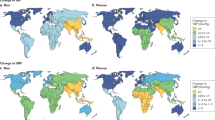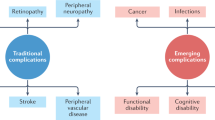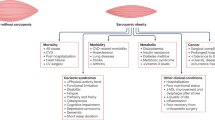Abstract
This study aimed to evaluate the relationship between pulse pressure (PP) and sarcopenia, frailty, and cognitive function in elderly patients with hypertension. We evaluated 435 elderly patients with a history of hypertension who visited the frail outpatient clinic between July 2015 and October 2021. Data at the 1-, 2-, and 3-year follow-ups were available for 222, 177, and 164 patients, respectively. Sarcopenia, frailty, and cognitive function, including Mini-Mental State Examination (MMSE) scores, were evaluated. The patients’ mean age was 79.2 ± 6.3 years (male, 34.9%). PP and mean blood pressure (BP) were 60.1 ± 13.6 mmHg and 94.1 ± 13.0 mmHg, respectively. At baseline, lower PP was associated with probable dementia (MMSE score ≤23 points) (OR = 0.960 per 1 mmHg increase; 95% CI, 0.933–0.989; P = 0.006) in the model adjusted for conventional confounding factors and comorbidities, whereas higher PP was associated with low handgrip strength (OR = 1.018 per 1 mmHg increase; 95% CI, 1.001–1.036; P = 0.041). In multivariate-adjusted logistic regression analysis of patients with preserved handgrip strength at baseline, reductions in PP (OR = 0.844; 95% CI, 0.731–0.974; P = 0.020) and mean BP (OR = 0.861; 95% CI, 0.758–0.979; P = 0.022) were significantly associated with the incidence of low handgrip strength at 3 years. In conclusion, a higher PP induced by increased arterial stiffness was associated with lower handgrip strength, whereas a lower PP was associated with probable dementia. Reduced PP was associated with decreased handgrip strength after three years.

This is a preview of subscription content, access via your institution
Access options
Subscribe to this journal
Receive 12 print issues and online access
$259.00 per year
only $21.58 per issue
Buy this article
- Purchase on Springer Link
- Instant access to full article PDF
Prices may be subject to local taxes which are calculated during checkout


Similar content being viewed by others
References
de Leeuw F-E, de Groot JC, Oudkerk M, Witteman JCM, Hofman A, van Gijn J, et al. Hypertension and cerebral white matter lesions in a prospective cohort study. Brain. 2002;125:765–72.
Bernick C, Kuller L, Dulberg C, Longstreth WT Jr, Manolio T, Beauchamp N, et al. Silent MRI infarcts and the risk of future stroke: the cardiovascular health study. Neurology. 2001;57:1222–9.
Gupta A, Giambrone AE, Gialdini G, Finn C, Delgado D, Gutierrez J, et al. Silent brain infarction and risk of future stroke. Stroke. 2016;47:719–25.
Williamson JD, Supiano MA, Applegate WB, Berlowitz DR, Campbell RC, Chertow GM, et al. Intensive vs standard blood pressure control and cardiovascular disease outcomes in adults aged >/=75 years: a randomized clinical trial. JAMA. 2016;315:2673–82.
Williamson JD, Pajewski NM, Auchus AP, Bryan RN, Chelune G, Cheung AK, et al. Effect of intensive vs standard blood pressure control on probable dementia: a randomized clinical trial. JAMA. 2019;321:553–61.
Ishikawa J, Toba A, Tamura Y, Araki A, Harada K. Changes in blood pressure associated with frailty and sarcopenia in elderly outpatients with cardiometabolic diseases. Geriatr Gerontol Int. 2023;23:506–16.
Ishikawa J, Seino S, Kitamura A, Toba A, Toyoshima K, Tamura Y, et al. The relationship between blood pressure and cognitive function. Int J Cardiol Cardiovasc Risk Prev. 2021;10:545–50.
Streit S, Poortvliet RKE, Gussekloo J. Lower blood pressure during antihypertensive treatment is associated with higher all-cause mortality and accelerated cognitive decline in the oldest-old-data from the Leiden 85-plus study. Age Ageing. 2018;47:545–50.
Benetos A, Labat C, Rossignol P, Fay R, Rolland Y, Valbusa F, et al. Treatment with multiple blood pressure medications, achieved blood pressure, and mortality in older nursing home residents: the PARTAGE study. JAMA Intern Med. 2015;175:989–95.
Liu X, Steinman MA, Lee SJ, Peralta CA, Graham LA, Li Y, et al. Systolic blood pressure, antihypertensive treatment, and cardiovascular and mortality risk in VA nursing home residents. J Am Geriatr Soc. 2023;71:2131–40.
Safar ME, Asmar R, Benetos A, Blacher J, Boutouyrie P, Lacolley P, et al. Interaction between hypertension and arterial stiffness. Hypertension. 2018;72:796–805.
Benetos A, Petrovic M, Strandberg T. Hypertension management in older and frail older patients. Circ Res. 2019;124:1045–60.
Toba A, Kariya T, Aoyama R, Ishiyama T, Tsuboko Y, Takeda K, et al. Impact of age on left ventricular geometry and diastolic function in elderly patients with treated hypertension. Blood Press. 2017;26:264–71.
Toba A, Ishikawa J, Harada K. Orthostatic hypotension and association of arterial compliance in elderly patients with hypertension: a pilot study. Blood Press Monit. 2017;22:274–8.
Sugie M, Harada K, Takahashi T, Nara M, Ishikawa J, Koyama T, et al. Relationship between skeletal muscle mass and cardiac function during exercise in community-dwelling older adults. ESC Heart Fail. 2017;4:409–16.
Tamura Y, Ishikawa J, Fujiwara Y, Tanaka M, Kanazawa N, Chiba Y, et al. Prevalence of frailty, cognitive impairment, and sarcopenia in outpatients with cardiometabolic disease in a frailty clinic. BMC Geriatr. 2018;18:264.
Fujiwara Y, Suzuki H, Yasunaga M, Sugiyama M, Ijuin M, Sakuma N, et al. Brief screening tool for mild cognitive impairment in older Japanese: validation of the Japanese version of the Montreal Cognitive Assessment. Geriatr Gerontol Int. 2010;10:225–32.
Saxton J, Morrow L, Eschman A, Archer G, Luther J, Zuccolotto A. Computer assessment of mild cognitive impairment. Postgrad Med. 2009;121:177–85.
Awata S, Sugiyama M, Ito K, Ura C, Miyamae F, Sakuma N, et al. Development of the dementia assessment sheet for community-based integrated care system. Geriatr Gerontol Int. 2016;16:123–31.
Chen LK, Woo J, Assantachai P, Auyeung TW, Chou MY, Iijima K, et al. Asian Working Group for Sarcopenia: 2019 Consensus Update on Sarcopenia Diagnosis and Treatment. J Am Med Dir Assoc. 2020;21:300–7.e302.
Satake S, Arai H. The revised Japanese version of the Cardiovascular Health Study criteria (revised J-CHS criteria). Geriatr Gerontol Int. 2020;20:992–3.
Makizako H, Shimada H, Doi T, Tsutsumimoto K, Suzuki T. Impact of physical frailty on disability in community-dwelling older adults: a prospective cohort study. BMJ Open. 2015;5:e008462.
Satake S, Senda K, Hong YJ, Miura H, Endo H, Sakurai T, et al. Validity of the Kihon Checklist for assessing frailty status. Geriatr Gerontol Int. 2016;16:709–15.
Watanabe D, Yoshida T, Watanabe Y, Yamada Y, Miyachi M, Kimura M. Validation of the Kihon checklist and the frailty screening index for frailty defined by the phenotype model in older Japanese adults. BMC Geriatr. 2022;22:478.
Sewo Sampaio PY, Sampaio RA, Yamada M, Arai H. Systematic review of the Kihon checklist: Is it a reliable assessment of frailty? Geriatr Gerontol Int. 2016;16:893–902.
Li C, Zhu Y, Ma Y, Hua R, Zhong B, Xie W. Association of cumulative blood pressure with cognitive decline, dementia, and mortality. J Am Coll Cardiol. 2022;79:1321–35.
Poels MMF, Zaccai K, Verwoert GC, Vernooij MW, Hofman A, Van Der Lugt A, et al. Arterial stiffness and cerebral small vessel disease. Stroke. 2012;43:2637–42.
Gupta N, Simpkins AN, Hitomi E, Dias C, Leigh R. White matter hyperintensity-associated blood-brain barrier disruption and vascular risk factors. J Stroke Cerebrovasc Dis. 2018;27:466–71.
Jefferson AL, Cambronero FE, Liu D, Moore EE, Neal JE, Terry JG, et al. Higher aortic stiffness is related to lower cerebral blood flow and preserved cerebrovascular reactivity in older adults. Circulation. 2018;138:1951–62.
Kohara K, Okada Y, Ochi M, Ohara M, Nagai T, Tabara Y, et al. Muscle mass decline, arterial stiffness, white matter hyperintensity, and cognitive impairment: Japan Shimanami Health Promoting Program study. J Cachexia Sarcopenia Muscle. 2017;8:557–66.
Tsao CW, Himali JJ, Beiser AS, Larson MG, Decarli C, Vasan RS, et al. Association of arterial stiffness with progression of subclinical brain and cognitive disease. Neurology. 2016;86:619–26.
Coelho Júnior HJ, Aguiar Sda S, Gonçalves Ide O, Sampaio RA, Uchida MC, Moraes MR, et al. Sarcopenia is associated with high pulse pressure in older women. J Aging Res. 2015;2015:109824.
Taekema DG, Maier AB, Westendorp RG, de Craen AJ. Higher blood pressure is associated with higher handgrip strength in the oldest old. Am J Hypertens. 2011;24:83–89.
Torjesen AA, Sigurðsson S, Westenberg JJM, Gotal JD, Bell V, Aspelund T, et al. Pulse pressure relation to aortic and left ventricular structure in the age, Gene/Environment Susceptibility (AGES)-Reykjavik study. Hypertension. 2014;64:756–61.
Sugie M, Harada K, Takahashi T, Nara M, Kawai H, Fujiwara Y, et al. Peak exercise stroke volume effects on cognitive impairment in community-dwelling people with preserved ejection fraction. ESC Heart Fail. 2018;5:876–83.
Ren QW, Katherine Teng TH, Tse YK, Tay WT, Li HL, Tromp J, et al. Incidence, clinical correlates, and prognostic impact of dementia in heart failure: a population-based cohort study. Jacc Asia 2023;3:108–19.
Reas ET, Laughlin GA, Hagler DJ, Lee RR, Dale AM, McEvoy LK. Age and sex differences in the associations of pulse pressure with white matter and subcortical microstructure. Hypertension. 2021;77:938–47.
Ishikawa J, Toba A, Tamura Y, Araki A, Harada K. Relationship between blood pressure and cognitive impairment in elderly outpatients with cardiometabolic diseases. Geriatr Gerontol Int. 2024;Suppl 1:110–7.
Umemura S, Arima H, Arima S, Asayama K, Dohi Y, Hirooka Y, et al. The Japanese Society of Hypertension Guidelines for the Management of Hypertension (JSH 2019). Hypertens Res. 2019;42:1235–481.
Funding
The authors were supported in part by research grants from the Tokyo Metropolitan Institute for Geriatrics and Gerontology (JI, YT); Research Funding for Longevity Sciences (22-9) from the National Center for Geriatrics and Gerontology (NCGG), Japan (JI, AT); and Ministry of Health, Labour and Welfare, Japan (JPMH21GB1002) (JI, YT).
Author information
Authors and Affiliations
Contributions
J Ishikawa, Y Tamura, and A Araki had full access to all the data in this study. J Ishikawa was responsible for the accuracy of the data analysis. Concept and design: J Ishikawa, Y Tamura, and A. Araki. Data acquisition, analysis, and interpretation: J Ishikawa, Y Tamura, and A. Araki. Drafting of the manuscript: J Ishikawa. Critical revisions: All authors. Statistical analysis: J Ishikawa.
Corresponding author
Ethics declarations
Conflict of interest
The authors declare no competing interests.
Additional information
Publisher’s note Springer Nature remains neutral with regard to jurisdictional claims in published maps and institutional affiliations.
Supplementary information
Rights and permissions
Springer Nature or its licensor (e.g. a society or other partner) holds exclusive rights to this article under a publishing agreement with the author(s) or other rightsholder(s); author self-archiving of the accepted manuscript version of this article is solely governed by the terms of such publishing agreement and applicable law.
About this article
Cite this article
Ishikawa, J., Toba, A., Futami, S. et al. Association of pulse pressure and mean blood pressure to frailty, sarcopenia, and cognitive dysfunction in elderly outpatients with history of hypertension. Hypertens Res (2024). https://doi.org/10.1038/s41440-024-01684-w
Received:
Revised:
Accepted:
Published:
DOI: https://doi.org/10.1038/s41440-024-01684-w



